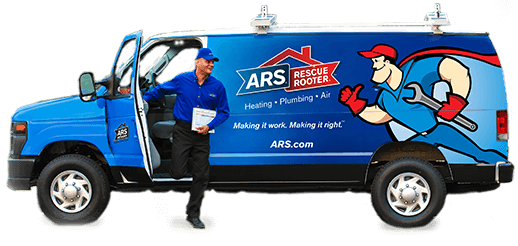Cleveland Water Heater Repair

Water Heater Repair Services
You could be surprised by waking up to take a cold shower! A good way to avoid this kind of surprise is to schedule regular water heater check-ups with your ARS®/Rescue Rooter® Cleveland plumber. With regular maintenance, your water heater will use less energy, perform better, and last longer!
If you're looking for industry-leading water heater service in Cleveland, OH, call us today to request service or schedule an appointment online.
Water Heater Repair Services in Cleveland, Ohio
Water heaters come in all shapes and sizes, and so do water heater problems. Our expert technicians can quickly identify the source of the problem and make the necessary repairs to ensure optimal efficiency and peak performance for your water heater.
There are many signs that it may be time to schedule a call for Cleveland water heater repair or maintenance. These water heater symptoms can include:
- Leaking water: Corrosion from rust or particulates over time can lead to water leaking from your hot water heater, possibly causing damage to floors or walls, or even contributing to mold growth.
- No hot water: Obviously, generating hot water is the whole point of a hot water heater! If your hot water heater has stopped producing hot water, it could be as simple as reigniting the pilot light (especially on older units), or a more serious issue with the hot water heater that a professional plumber may need to address. Diminished amounts of hot water from a water heater can also lead to higher utility bills, as a water heater uses more power for fewer results.
- Rust in tank: Rust can lead to major corrosion and major problems down the line. When rust is present, this can often mean that the anode rod in the water heater needs to be replaced. This is a fairly easy fix for our technicians which can help prevent much worse problems later on.
Common Water Heater Damage
Sediment can often build up in water heater tanks and damage them. In order to remove these sediments, you may need to drain the tank. To perform this task, it is recommended that you hire a plumber to avoid any issues.
If you see any rust or metal in the water coming from your tank, immediately call the Cleveland, OH plumbers at ARS®/Rescue Rooter®. The rust or metal particles may indicate that the anode rod in your tank needs to be replaced. This rod attracts corrosive elements that are in the tank water and keeps them from creating rust on the tank’s liner. Another issue to look for is corrosion on the water heater liner. If it corrodes, the unit can begin leaking. If your water heater’s drain pan is old or installed incorrectly, leaking water could damage your home’s walls, floors, or ceilings, depending on where the water heater is located within your home.
As a precaution, always shut off the gas or turn off the power at your circuit breaker before inspecting your water heater.
Should You Repair or Replace Your Water Heater?
In some cases, our technicians will recommend that you replace your water heater rather than invest in repairs. This is generally the case when the water heater is more than 10 years old or the cost of repairs would total more than half the cost of a whole new unit. Typically, a water heater that breaks down after a warranty expires should be replaced. In most instances, the cost savings from the increased efficiency of a new water heater far outweighs the poor performance of the old water heater.
What to consider when replacing
When looking to replace your water heater, the kinds of things you need to consider that your technician can help explain are:
- The comparison between the initial cost of the unit and the expected operating cost of the system over its expected lifespan.
- The predicted maintenance schedule and costs of the system, as well as the common repair needs and costs associated with wear and tear over time.
- The manufacturer’s warranty available with any new system, including its length and the type of failures it covers.
- The energy efficiency of the models you are considering and how much they can save you on long-term costs, based on your estimated usage and their lifetime.
- The type of fuel you prefer your water heater to use, as well as its predicted cost and availability in the future. Modern water heaters can use gas, oil, electricity, and solar energy as potential fuel sources.
- Whether one water heater is enough for your home, or if you might benefit from two or more appliances to better meet your needs.
- The amount of hot water you use each day and whether your existing water heater is able to meet that demand. This amount is typically based on the number of people in your home./li>
Selecting a water heater with the right capacity and recovery time to meet your family’s expected hot water demands will result in the function you want and the savings you expect.
New Water Heater Options to Choose From
- Gas water heaters are the most common appliances in use in the United States. A gas water heater may be fueled by natural gas, propane, or oil. Gas storage hot water tank heaters contain a tank ranging from 20-80 gallons, which is fed from the bottom by a cold water intake. The water is heated inside the tank, then exits the top via a pipe leading into your home when you open the tap.
- Tankless water heaters are often called on-demand water heaters. These water heating systems create hot water as it is needed by heating the water that flows from your water main to your tap, bypassing the need for a tank. A tankless water heater often costs less to operate over its lifetime, but typically costs more upfront than storage tank water heaters. Depending on your needs, you may need more than one tankless water heater to meet your daily hot water demands.
- Electric water heaters also heat water inside a storage tank for distribution throughout your home. In this case, two electric heating elements controlled by individual thermostats are responsible for heating the water inside the tank.
- Solar water heaters consist of a storage tank and a solar collector. The collector converts energy from the sun into heat, which in turn warms the water. Solar water heaters installed in some locations may require additional design elements to accommodate hot water needs during cloudy weather.
Cost and Efficiency
Storage tank water heaters are typically the least expensive systems. However, all storage water heaters lose some amount of heat over time because they must constantly keep water in the tank hot. Despite this standby heat loss, storage water heaters have come a long way in terms of efficiency; opting for the most efficient system you can afford will help you recoup greater energy savings over time.
Tankless water heaters cost more to purchase and install than storage systems but save money on both energy and water by eliminating standby heat loss and heating water faster so less cold water is wasted while you wait.
When considering the cost of a new water heater, it’s also important to consider the cost of installation, including strapping, water line connection, and gas line installation or connection. Never trust a “blind quote” given over the phone, as it cannot take into account all the factors associated with water heater replacement. Talk to your plumber at ARS/Rescue Rooter Cleveland for a free in-person evaluation and personalized quote for new water heater installation or heater repair in Cleveland, OH.
Special Offers
Reviews for
Rescue Rooter Cleveland




Step 2 of 2